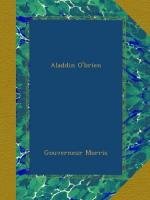The second volume of “The Headsman” went like cakes and syrup on a cold morning, for it was narrative, and then it was laid aside, because it was dull. The four German books had their cuts almost examined out of them, and the encyclopedia book, from “Safety-lamps to Stranglers,” practically had its contents torn out and devoured. In after life Aladdin could always speak with extraordinary fluency, feeling, and understanding on anything that began with S, such as Simeon Stylites and Senegambia. But the poems of Poe were what made his sickness worth while and put the call upon all his after life. We learn of the critics and professors of English that there are greater lyric poets than Poe. They will base this on technicalities and theories of what poetry has been and what poetry ought to be, and will not take into account the fact that of all of them—Keats, Shelley, Wordsworth when he is a poet at all, Heine, and the lyric body of Goethe and the rest—not one in proportion to the mass of his production so often leaves the ground and spreads wings as Poe,—
If I might dwell
Where Israfel
Hath dwelt, and he where I,
He might not sing so wildly
well
A mortal melody,
While a bolder note than his
might swell
From my lyre within the sky,—
and that where they have, they have perhaps risen a little higher, but never have sung more hauntingly and clear. The wonderful sounds and the unearthly purity—the purity of a little child that has died—took Aladdin by the throat and shook up the imagination and music that had lain dormant within him; his father’s bent for invention clarified into a passion for creation. The first thing he read was three stanzas on the left-hand page where the book opened to his uneager hands, and his eyes, expectant of disappointment, —for up to that time, never having read any, he hated poetry,—fell on one of the five or six perfect poems in the world:
Helen, thy beauty is to me
Like those Nicean barks of
yore
That gently o’er a perfumed
sea
The weary, wayworn wanderer
bore
To his own native shore.
On desperate seas long wont
to roam,
Thy hyacinth hair, thy classic
face,
Thy naiad airs have brought
me home
To the glory that was Greece,
And the grandeur that was
Rome.
Lo, in yon brilliant window-niche
How statue-like I see thee
stand,
The agate lamp within thy
hand!
Ah, Psyche! From the
regions which
Are holy land.
And he knew that he had read the most exquisite, the most insouciant, and the most universal account of every man’s heart’s desire—Margaret as she would be when she grew tall. He knew little of the glory that was Greece or the grandeur that was Rome, but whatever they were, Margaret had all of them, and the hyacinth hair, very thick and clustery and beautiful, and the naiad airs. Ah, Psyche!




